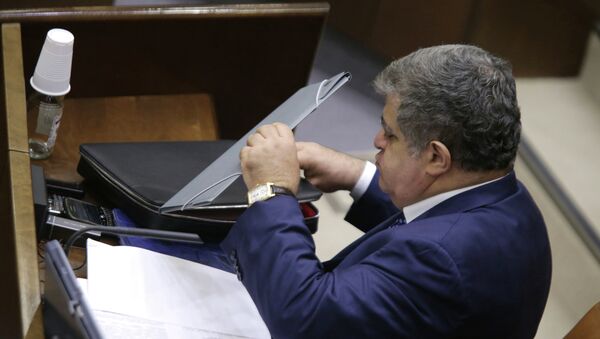MOSCOW, October 27 (RIA Novosti) - Russia's upper parliamentary house, the Federation Council, will try to cooperate with Ukraine's newly-elected parliament, though its legitimacy is questionable, a senior Russian lawmaker told RIA Novosti on Monday.
"We will try to cooperate, interact with it [the Ukrainian parliament] in any case. We hope that our new colleagues will be guided by reason," the head of the Russian monitoring committee on Ukraine in the upper house of Russian parliament Vladimir Dzhabarov said.
He emphasized, however, that the legitimacy of the vote is doubtful.
"The South-East has not voted, besides, there have been numerous irregularities," the lawmaker said, adding that Federation Council Speaker Valentina Matvienko has sent an invitation to the Ukrainian parliament to take part in the Commonwealth of Independent States' inter-parliamentary assembly to be held in St. Petersburg in November.
Dzhabarov concluded by arguing that the new Ukrainian parliament will be more radical than the previous one, elected in 2012.
Also on Monday, a senior Federation Council member Andrei Klishas enumerated the conditions under which the Russian and Ukrainian parliaments could work together.
"We will cooperate at inter-parliamentary level with those political forces in the Rada [the Ukrainian parliament], which will stand for the end of the civil war, … with those parliament members, who will oppose Ukraine's turning into a neo-Nazi, nationalist country with lawlessness and mass human rights violations holding sway," the lawmaker told RIA Novosti.
Ukrainian parliamentary election took place on Sunday. With 25 percent of the ballots counted, Prime Minister Arseniy Yatsenyuk's People's Front party and the pro-president Petro Poroshenko's Bloc are running neck-to-neck, having garnered 21.69 and 21.65 percent of the vote respectively. The two parties are followed by Samopomich (Self-Help) party with 10.55 percent.
Authorities in Ukraine’s breakaway regions of Donetsk and Luhansk said they would not go to polls on October 26. According to Ukraine's Central Election Commission, the Donetsk and Luhansk regions have shown the lowest turnout in the country of around 32 percent.


